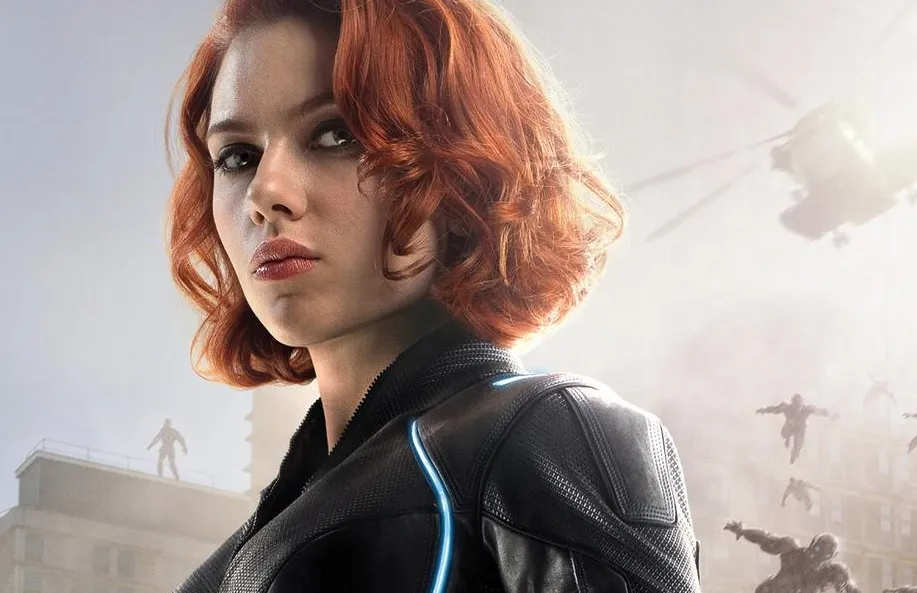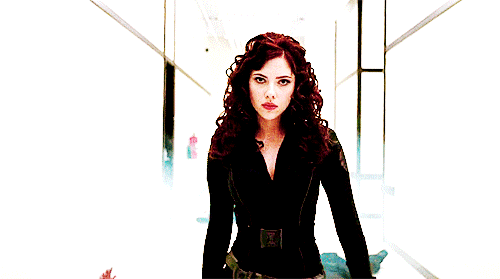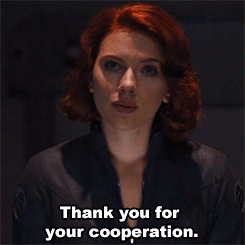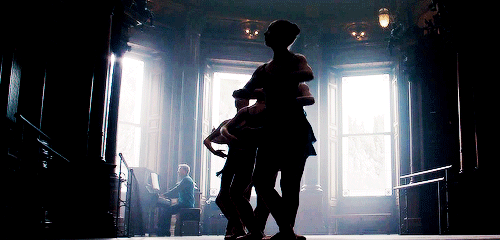Natasha Romanoff, aka Natalia Romanova, aka Black Widow, is one of the most fascinating and complex characters in the Marvel canon. The reason is quite simple: she’s an unadulterated badass. Portrayed by Scarlett Johansson in the Marvel Cinematic Universe, Natasha has built an impressive fanbase through the Avengers and Captain America franchises due to her wit, incredible combat skills, and personal history as a trained KGB operative who switched allegiances to SHIELD. She is a needed shot of estrogen in a male-dominated comics landscape, unique in many ways because she is a woman; she is able to use her her femininity and the stereotypes people expect of women to her advantage, and as a result, is an example of a feminism that can exploit from inside an established, patriarchal system. She plays the game better than anyone, because she has had little to no choice.
Note: I wish I could have used scenes/moments from Captain America: The Winter Soldier and Captain America: Civil War, but for the sake of time and brevity those had to be excised. Feel free to add on to this conversation in the comments! Also, I’m hopeful to return to this argument when I finish a deep dive into the Marvel 616 version of Natasha, and do a full comparative study, but obviously that will take a while! Give me things to read!
Iron Man 2: Natalie Rushman
We first meet the MCU’s version of Black Widow not as Natasha Romanoff, but as Natalie Rushman, an employee of Stark Industries. She is presented as a demure observer, and sometimes a little nervous, but quick with a sly remark as needed. This, of course, is the point; Natasha is playing a character, so Tony Stark will fall right into assuming that she’s a harmless employee. It works: Tony makes her his assistant, relentlessly hits on her, and attempts to get as close to her as possible, at times trying to find out who she really is and finding sexy photos of her online (which were, of course, planted for Tony to find). Later in the movie, when Natasha’s true identity as a SHIELD shadow is revealed, Tony’s only response is, “You’re fired.” Natasha quips back, “That’s not up to you.” Natasha never belonged to Tony (nor anyone, but that aspect doesn’t get explored as much in this particular outing).
Natasha’s storyline in Iron Man 2 subverts our expectation of the quiet secretary stereotype. Stark is made to look messy and gross because his treatment of Natalie is messy and gross, and Natasha ends up basically saving the day all by herself; at the climax of the film, Black Widow infiltrates Vanko’s lab to retrieve the controls for Rhodes’s Mark II armor. Stark’s bodyguard and driver Happy Hogan bullies his way into helping, ignoring Natasha’s orders to stay in the car. He also leers at her while she changes into her Black Widow suit in the back of the car, a moment played for laughs in the film, but it also made me uncomfortable (remember, Happy is played by Jon Favreau, the director of Iron Man 2, so this just seemed like a reason for Favreau to gawk at Scarlett Johansson). This ends up biting Happy in the ass, though—while he gets into a prolonged fistfight with the first guard they encounter, Black Widow takes down an entire floor of security and also works through the computer system to get the armor controls back to Rhodey. Truly, Happy should have just stayed in the car and avoided all that embarrassment.
The portrayal isn’t without its flaws—the reveal of Natalie as Natasha comes way too late for her to have much of a discernible impact aside from the fight in Vanko’s lab, and it’s clear from the script that Justin Theroux wasn’t really sure how to showcase the history of Black Widow. Thankfully, the MCU was just getting started, and Scarlett Johansson has had many more opportunities to display how great Black Widow is.
The Avengers: Loki’s Mistake
One of the greatest scenes in the entire Marvel Cinematic Universe is when Black Widow interrogates Loki on the helicarrier. You don’t really get a sense, as the viewer, how specific and brilliant Natasha’s manipulation is until the very end of the scene (even though she does something nearly identical in the movie’s first act). At first, Natasha is almost relaxed with Loki, even sitting down at one point to set him off guard. She openly discusses how her history with Clint Barton/Hawkeye informs her need for him to be set free, picking up on Loki’s assumptions that this could be some kind of a “love story,” a narrative she dismisses but then seems to indulge in for Loki’s sake. She even talks a little about the “red on (her) ledger,” a history we delve further into in Age of Ultron, and pokes fun at her Russian lineage. The whole scene is much more open and seemingly relaxed than the previous interrogation attempt by Nick Fury, with Loki even smiling at Natasha as she tells her story. The tables seem to turn when Loki reveals he knows exactly what’s on Natasha’s ledger and follows that up by telling Natasha he’ll make Barton kill her before “splitting his skull.” Nat’s face is sheer terror, to the point where she even has to turn away from Loki while he calls her a “mewling quim.” As the audience, we feel for her, because we can see how badly this is affecting Natasha, and we wonder if Loki has really gotten to her. Maybe Natasha isn’t as brilliant as she lets on.
But then, when Loki reveals that he plans to use the Hulk as his major power play, Natasha turns on a dime. Loki—and the audience—realize in unison that she has been in control the entire time. She needed to get Loki to admit that his goal is to weaponize Hulk; once she has that intel, there’s no need to remain in the room. Her final line, “Thank you for your cooperation,” reinforces that she was truly in charge of the conversation and it leaves Loki—and again, the audience—stunned. As a fan of the movies and of Black Widow, this entire exchange thrilled me to my core because Natasha is playing on expectation. She knows Loki will think she’s weak, so she brings up Barton as a way to showcase a vulnerability that will appeal to the trickster god. Loki in turn plays right into Natasha’s hands by threatening her and ultimately showing his hand, forgetting that Natasha dealt from a stacked deck. Natasha is also subverting the audience’s expectations—they presume Natasha is showing the “vulnerable woman” side we’re accustomed to seeing every female superhero show at some point in these types of movies to prove that they’re human, or feminine. Natasha isn’t that kind of hero. As Loki points out, her ledger is “gushing red,” and she got that way by playing the game expertly.
It bears stating no one else on the entire Avengers squad could have done what Natasha does in this scene, because the way Natasha uses and twists Loki’s assumptions throughout the scene is something only a woman could do (remember, Fury tried to get info out of him earlier and failed miserably). Because it’s Natasha, Loki is relaxed and unguarded and at points, borderline seductive. He is, as previously mentioned, the trickster god, but he becomes much more sensual and feline in this scene because he tries to play to what he thinks his audience (both Natasha and the viewers at home) wants to hear. What makes Natasha so brilliant is that she knows this and weaponizes it.
Age of Ultron: The Red Room
The one that had people hiding out with pitchforks on the Internet because of a scene in which Natasha tells Bruce Banner about what the “red on her ledger” is all about—she was transformed into a KGB assassin in the Soviet Red Room, an academy that trains young girls as spies and mercenaries. At the climax of her training, Natasha was sterilized in order to continue on as the Black Widow. “You still think you’re the only monster on the team?” she asks Bruce.
This scene was so controversial that complaints and attacks drove Joss Whedon off Twitter (which in and of itself could be an entirely different article about the ways men and women are dichotomously treated on social media). Many people have argued, convincingly, that when Natasha is talking about herself as a monster she’s talking specifically about her infertility, as if being unable to bear children makes one monstrous. However, I would like to posit that Natasha is actually referring to the choice she made to sterilize herself in the first place, and of the motivation behind it—Natasha chooses to be barren to become a more efficient, ruthless killer. Of course, it wasn’t much of a choice to begin with, as Natasha knew there was no alternative. The bearing of children has very little to do with her monstrous state; rather, the reasons behind her lost fertility and positioning as a cold-blooded killer—the best the Red Room ever produced—are what make Natasha monstrous to herself. She is what she made herself, and with that comes flaws and regrets.
It bears noting that Natasha may have been coerced into sterilization; remember, this is the same department that trained The Winter Soldier/The Asset, and in the comics Natasha’s memory has been modified in ways similar to Bucky’s, so that might make an appearance in the MCU. (And as someone who has great affinity for the Bucky/Natasha storyline, may I just put out a call to the Powers that Be over at the MCU: Make this happen!) It could even also be argued that Nat’s guilty outlook on herself could stem from the fact that maybe, yes, sometimes she does regret not being able to bring children into the world, because now she absolutely cannot. The total lack of choice she has now, is no small matter. It almost reminded me of the scene on How I Met Your Mother when Robin Scherbatsky (coincidentally played by Cobie “Maria Hill” Smulders) talks about how she doesn’t want children, and then cries when told she is infertile. Perhaps we can mourn something even if we don’t want it, because the choice has been taken away.
Could this all have been better articulated by Whedon’s script? Of course; Age of Ultron, to me, is the weakest of the MCU films thus far, and Whedon’s positioning of Natasha as someone in need of rescue at all makes me really angry, considering how brilliantly her character is handled by the writers and the directors in the Captain America series of films. But I feel that this entire scene gets misunderstood by the fandom at large, and given what Johansson had to work with, it could have been worse. It also bears noting that Johansson was herself pregnant during filming and they had to change around a lot of the script, so maybe there was a whole different version of things that could have given her more agency?
The Black Widow has a rich history, one that has been tapped into with great success by the various directors in the MCU. The thing that makes Black Widow so special is that she knows the world will always see her as something slightly less than her Avengers counterparts, mainly because she’s battling alongside amplified humans and literal gods, but also because she’s one of the only women on the team (so far, that is; I cannot wait to see what Brie Larson does with Captain Marvel!). To that end, Natasha exploits and subverts our expectations of femininity by leaning into the stereotypes, only to turn them on their heads before the villains can figure out what hit them. Is it vastly important to have female leads that work outside the chosen patriarchal system? Of course, and I hope the next slate of Marvel films (and DC films) do more with women who rebel ferociously. But sometimes, the way feminism works is to take out a system from the inside, and for that, we have the brilliance, skill, and nuance of Natasha Romanoff.
Want more stories like this? Become a subscriber and support the site!
Alysa Auriemma is a teacher, writer, activist, geek, cosplayer, and her friend group’s feminist killjoy. Her blog, The Curious Ally Cat, has seen notice by newspapers such as the Hartford Courant and the New York Times. She is in the process of writing a series of fantasy novels for self-publication. In her spare time, she enjoys participating in community theater, solo trips to the city to see Broadway shows, really good Mexican food, and arguing with friends about which Mighty Ducks movie is the best (D2).
—The Mary Sue has a strict comment policy that forbids, but is not limited to, personal insults toward anyone, hate speech, and trolling.—
Follow The Mary Sue on Twitter, Facebook, Tumblr, Pinterest, & Google+.











